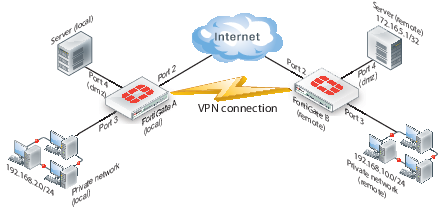Defining policy addresses
A VPN tunnel has two end points. These end points may be VPN peers such as two FortiGate gateways. Encrypted packets are transmitted between the end points. At each end of the VPN tunnel, a VPN peer intercepts encrypted packets, decrypts the packets, and forwards the decrypted IP packets to the intended destination.
You need to define firewall addresses for the private networks behind each peer. You will use these addresses as the source or destination address depending on the security policy.
Example topology for the following policies

In general:
- In a gateway-to-gateway, hub-and-spoke, dynamic DNS, redundant-tunnel, or transparent configuration, you need to define a policy address for the private IP address of the network behind the remote VPN peer (for example,
192.168.10.0/255.255.255.0or192.168.10.0/24). - In a peer-to-peer configuration, you need to define a policy address for the private IP address of a server or host behind the remote VPN peer (for example,
172.16.5.1/255.255.255.255or172.16.5.1/32or172.16.5.1).
For a FortiGate dialup server in a dialup-client or Internet-browsing configuration:
- If you are not using VIP addresses, or if the FortiGate dialup server assigns VIP addresses to FortiClient dialup clients through FortiGate DHCP relay, select the predefined destination address “all” in the security policy to refer to the dialup clients.
- If you assign VIP addresses to FortiClient dialup clients manually, you need to define a policy address for the VIP address assigned to the dialup client (for example,
10.254.254.1/32), or a subnet address from which the VIP addresses are assigned (for example,10.254.254.0/24or10.254.254.0/255.255.255.0). - For a FortiGate dialup client in a dialup-client or Internet-browsing configuration, you need to define a policy address for the private IP address of a host, server, or network behind the FortiGate dialup server.
To define a security IP address
- Go to Policy & Objects > Objects > Addresses and select Create New.
- In the Name field, type a descriptive name that represents the network, server(s), or host(s).
- In Type, select Subnet.
- In the Subnet/IP Range field, type the corresponding IP address and subnet mask.
For a subnet you could use the format172.16.5.0/24or its equivalent172.16.5.0/255.255.255.0. For a server or host it would likely be172.16.5.1/32. Alternately you can use an IP address range such as192.168.10.[80-100]or192.168.10.80-192.168.10.100. - Select OK.

